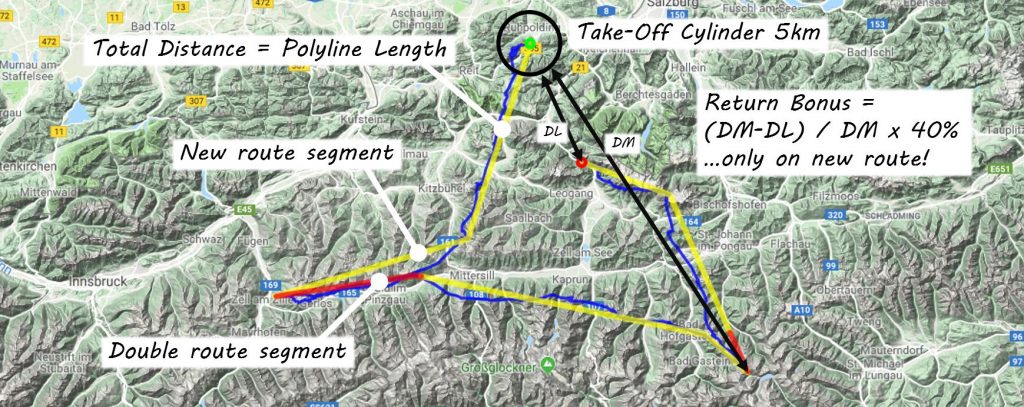Introduction
Cross Country Paragliding Revolution
The Cross Country Paragliding Revolution (short: XCR) is an international cross-country flight competition in the region of the Alps. A team of top cross-country pilots has developed a completely new approach how to evaluate and compare paragliding flights in a set sports rules. There are no more pre-defined numbers of turnpoints or fixed geometric forms, which a pilot has to follow. Still the new evaluation algorithms enable us to compare different flights with each other in a fair and performance oriented way. There are three main factors, which lead to more points:
- Distance. The greater the distance of the flight, the more points it gets.
- Return. The nearer the landing is to the take-off, the higher the flight is rated.
- New routes. The return bonus is only counted for the part of the routes, which the pilot has flown once in that flight.
This set of major rules has been developed such, that performance-oriented strategical or tactical routing decisions can be made intuitively and without a flight computer. In the following, these XCR main rules are described in detail.
The Distance
The distance of cross-country flight is defined by the route, that a track would follow, if not every small turn or circle is taken into account. Mathematically speaking, this is achieved by “smoothing” the flight track within a specific range. This smoothing range is increasing depending on the total distance of the flight. The total length of the resulting segmented line (“polyline”) is the distance which counts for the evaluation.
The Return
Generally, a flight route which leads back to the starting point is more difficult than a flight in one direction. To take this into account, bonus points increase from the furthermost point to a maximum of 40%, if the landing location is within a radius of 5km of the take-off location. This bonus is given on the total distance of new route.
The New Route
The pilot’s performance is deemed better, if he does not use the same routes twice in one flight. In XCR, a route segment is counted as new, if it is not within the smoothing range of another route segment.

Example of an XCR Track. Yellow: New Route, Red: Double Route.
Why is XCR limited to the Alps region?
Cross-country flights in mountains and flats are very different in tactics and strategy and therefore are very difficult to compare in the same set of sports rules. The rules an factors of the XCR competition are optimized for mountain regions.
The League
At XCR pilots compete within a league system, comprising the leagues “Silver”, “Gold” and “Diamond”. The separation of the ranking into different leagues enable us to adjust the evaluation of the pilot’s performance individually, so the competition is interesting, motivating and save for all kinds of cross-country pilots.
The Wing-Factors
The performance of a glider, which is theoretically possible, is mainly influenced by two factors: The aspect ratio and the size of the wing. A higher aspect ratio decreases the total drag while producing the same lift. A larger wing is generally performing better due to decreased relative friction forces and relative weight of materials.
Because there are no fixed performance classes in paragliding, a factor is calculated for each model individually, depending on the technical specifications of the wing. In XCR, the flat aspect ratio and the averaged take-off weight is used as parameters in the formula. For special occasions, for example a very asymmetric take-off weight range, the race committee might adjust the factor on individual basis.
The wing factors are weighted differently depending on the league, to which a flight has been committed. For example, the bonus points of a wing with less aspect ratio is three times higher than in the diamond league. With these weighted wing factors, newcomers or intermediate cross-country pilots have no benefit from switching to a high performance wing – because more aspect ratio generally means a more demanding handling.
Qualification and XCR-Level
Each pilot qualifies for a league by his personal XCR-Level. This level is calculated from his best season within the last five years. The result of each season is determined by the pilot’s best three flights. The qualification tiers are:
- Level 1-14: Silver League
- Level 15-29: Gold League
- Level 30+: Diamond League
Until June 30th of each season pilots is automatically promoted to the according league by uploading old or new flights. From July 1st until the end of the season the leagues are fixed. This prevents the disturbance of the competition about the upper ranks of the leagues. However, each participant can choose to be promoted on request, if he qualifies (wildcard rule).
Rankings and Relegation
Only if the participant uploads at least one valid flight for the current season, he is listed in the rankings. If the pilot does not have a valid flight, he will not be relegated, but also will not be listed in the league rankings.
If the XCR-Level of the pilot decreases, he will be automatically relegated to the according league. In special cases also the race committee can decide to relegate a pilot.


